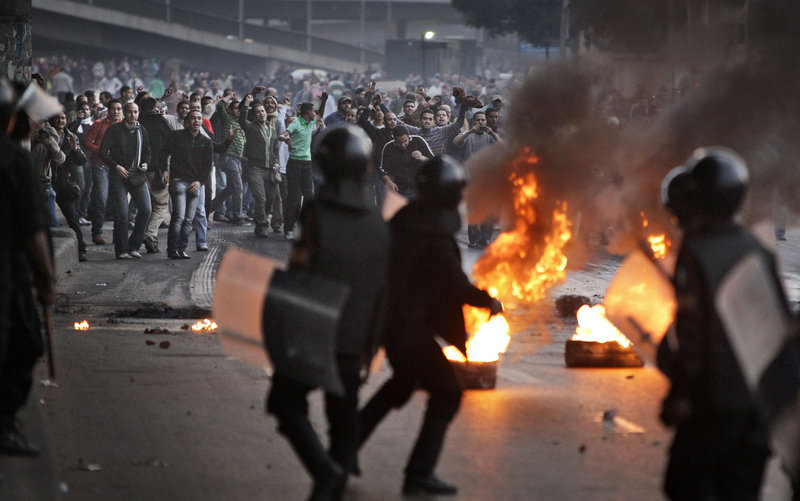CAIRO, Egypt – Thousands of Egyptians vented their rage against President Hosni Mubarak’s autocratic government in a second day of protests Wednesday that defied a ban on public gatherings. Baton-wielding police responded with tear gas and beatings in a crackdown that showed zero tolerance for dissent.
Egypt’s largest anti-government protests in years echoed the uprising in Tunisia, threatening to destabilize the leadership of the most important U.S. ally in the Arab world. The ability of the protesters to sustain the momentum for two days in the face of such a heavy-handed police response was a rare feat in this country.
One protester and a policeman were killed Wednesday, bringing the two-day death toll to six. Some 860 people have been rounded up, and Facebook, Twitter and cell phones — key to organizing protests — have been disrupted.
Secretary of State Hillary Rodham Clinton called on Egypt to adopt broad reforms and not crack down on the anti-government crowds. She urged the Mubarak regime to “take this opportunity to implement political, economic and social reforms that will answer the legitimate interests of the Egyptian people.”
Still, there was no indication that Mubarak, who has ruled with an iron fist for nearly 30 years, intends to relinquish power or make democratic or economic concessions, and no sign he would rein in his security forces.
The defiant demonstrations continued late into the night. In Cairo, dozens of riot police with helmets and shields charged more than 2,000 marchers on a downtown boulevard along the Nile. Smaller clashes broke out across the capital. In one, protesters stoned police, who responded with a volley of tear gas from a bridge over the Nile.
One protester, businessman Said Abdel-Motalib, called the civil unrest “a red light to the regime. This is a warning.”
Although Wednesday’s demonstrations were smaller than the tens of thousands who rallied a day earlier, the latest unrest follows repeated public outcries in recent months over police brutality, food prices, corruption and, more recently, sectarian strife between Christians and Muslims.
Parliamentary elections in November were widely decried as fraudulent, rigged to allow candidates from Mubarak’s ruling National Democratic Party to win all but a small fraction of the chamber’s 318 seats.
Many in Egypt see the events as a sign of the authoritarian leader’s vulnerability in an election year. There is speculation the 82-year-old Mubarak, who recently experienced serious health problems, may be setting his son Gamal up for hereditary succession.
There is considerable public opposition to a father-son succession and, according to leaked U.S. diplomatic memos, such a scenario does not meet with the approval of the powerful military. Still, the regime’s tight hold on power has made it virtually impossible for any serious alternative to Mubarak to emerge.
Send questions/comments to the editors.



Success. Please wait for the page to reload. If the page does not reload within 5 seconds, please refresh the page.
Enter your email and password to access comments.
Hi, to comment on stories you must . This profile is in addition to your subscription and website login.
Already have a commenting profile? .
Invalid username/password.
Please check your email to confirm and complete your registration.
Only subscribers are eligible to post comments. Please subscribe or login first for digital access. Here’s why.
Use the form below to reset your password. When you've submitted your account email, we will send an email with a reset code.